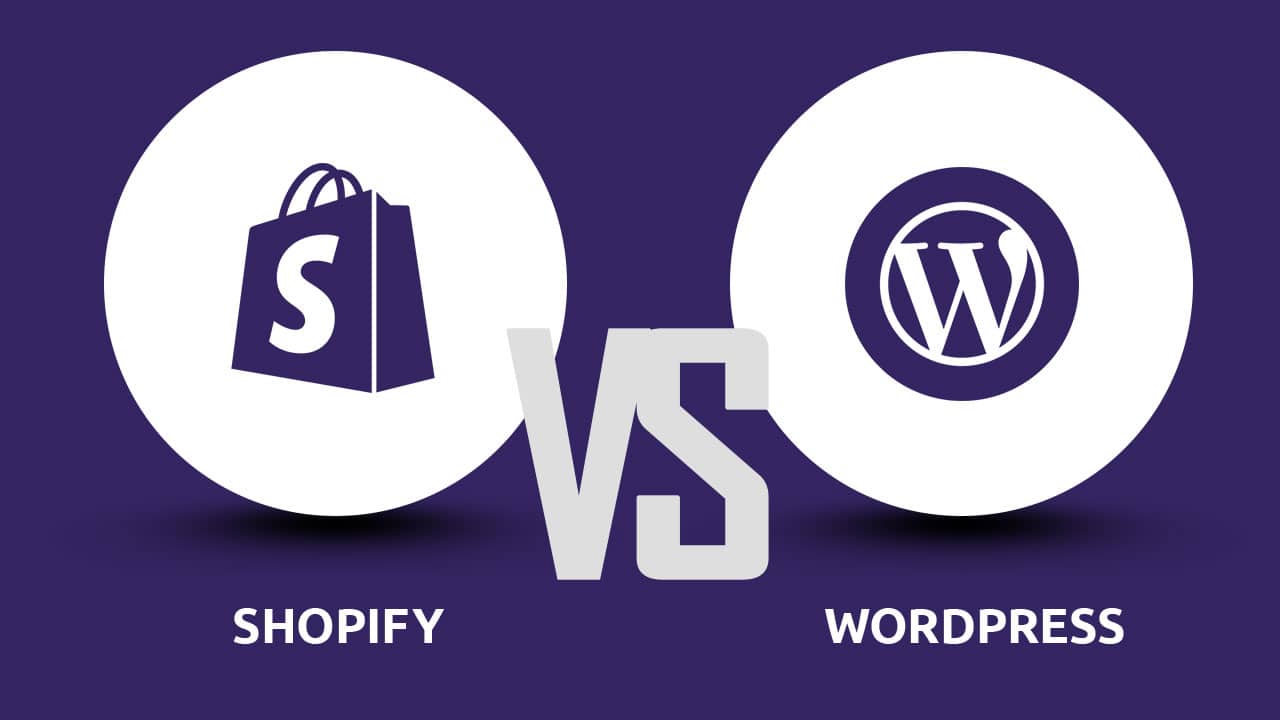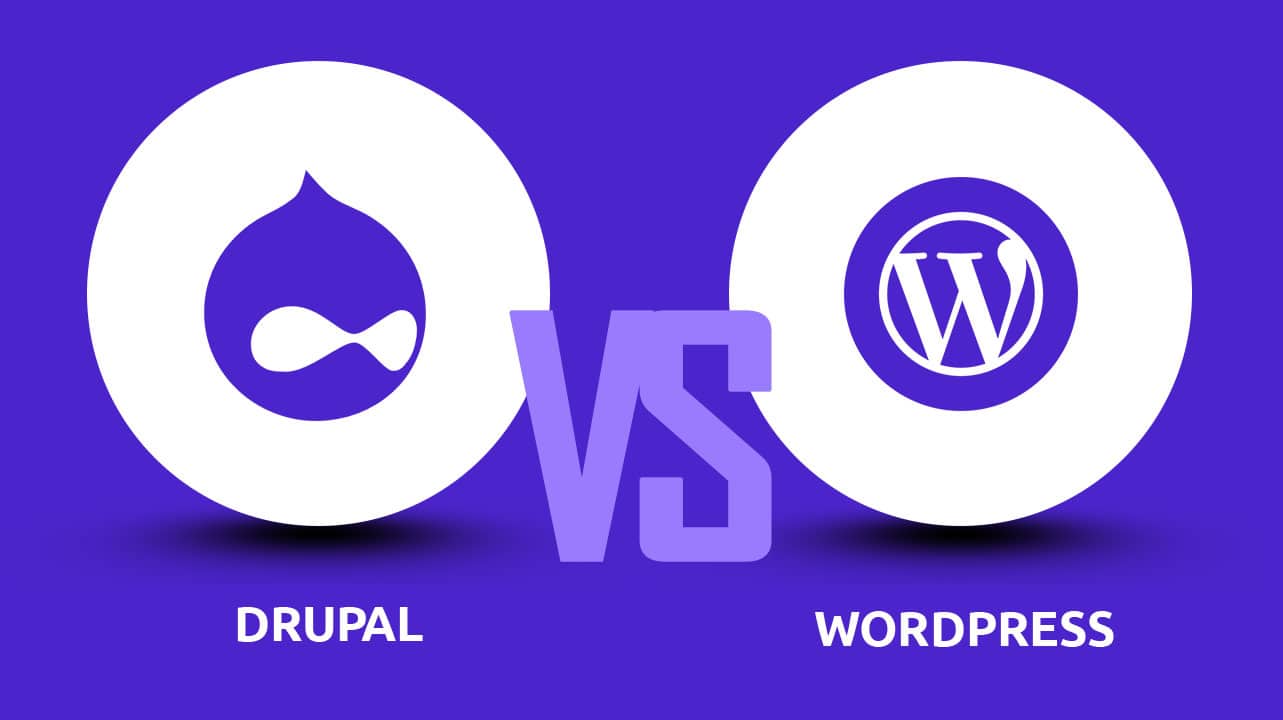The WordPress platform: what is it?

WordPress is a free and open-source content management system (CMS) based on PHP and MySQL. It is the most popular website platform in the world, with over 60 million websites using it. WordPress was first released in 2003 and has since evolved to include features such as templates, plugins, and themes. With these features, users can easily create and manage the design, layout, and content of their website without needing to have extensive programming knowledge.
When it comes to choosing between Shopify or WordPress, users can opt to install WordPress software on their web server or use the WordPress.com hosting service to create their website. With WordPress, users can easily customize their website design and functionality. The platform is user-friendly and provides an intuitive dashboard. Additionally, users can take advantage of a broad range of third-party plugins and themes to make their website look professional. With a strong community that provides support and resources, WordPress is an excellent option for website creation.
The Shopify platform: what is it?

Shopify is an e-commerce platform that allows individuals and businesses to create their own online stores and sell products or services. It offers a variety of features and tools to help users manage their store, including inventory management, order fulfilment, payment processing, and website design and customization. Shopify also integrates with other tools and apps, such as shipping and logistics providers, social media platforms, and marketing and analytics tools.
When comparing Shopify vs WordPress, one notable advantage of Shopify is its user-friendliness, which enables users to create and launch their e-commerce store in a matter of minutes. Moreover, Shopify provides various pricing plans to cater to businesses of different sizes and budgets. Thanks to its intuitive interface and comprehensive functionality, Shopify remains a popular option for small business owners, entrepreneurs, and independent content creators who want to extend their online visibility and tap into new customer markets. Therefore, if you are trying to decide between Shopify or WordPress for your e-commerce website, keep in mind that Shopify WordPress provides the convenience and flexibility that can help you get started quickly and scale your business effectively.
What are the pros and cons of using WordPress VS Shopify?

Pros of using WordPress:
- Customizability -Since WordPress is a highly customizable platform, you can create a store customized to meet your specific needs and brand identity. You can easily add or remove features and functionality using plugins and themes.
- Cost – WordPress is an open-source platform, which means that it is free to use. To get started, all you will need to pay for is hosting, the domain name, and any premium plugins or themes that you may want to use. Small businesses and startups may find it to be an affordable option as a result.
- SEO – The WordPress platform comes with excellent SEO functionality out of the box, and there are also many plugins available that can help you optimize your store for search engines.
- Community – WordPress has a large and active community of developers and users, which means you can access a wealth of knowledge and resources when it comes to building and maintaining your store.
Cons of using WordPress:
- Maintenance – WordPress is a self-hosted platform that requires you to maintain and update it yourself. It can be time-consuming and requires some technical expertise to get it done.
- Security – WordPress stores are susceptible to security threats just as they would be on any other self-hosted platform. For your store to be secure, it is vital that you keep your site and plugins up to date at all times.
Pros of using Shopify:
- Ease of use – Shopify is an easy-to-use platform that is easy to set up and use; it is easy to use even for those who do not possess any technical expertise.
- Hosting and security – All of the hosting and security of your store are handled by Shopify, which means that you do not have to worry about maintaining your site or protecting it from threats.
- Built-in eCommerce functionality – Shopify is a platform dedicated to eCommerce, which means it has all of the features and tools that you will need to set up and run a successful online store. This includes abandoned cart recovery, gift cards, and discount codes.
Cons of using Shopify:
- Monthly Fee – Even though Shopify offers a free trial, it is a paid platform and requires a monthly subscription fee to use it. There are also additional fees for certain features and transactions.
- Limited customizability – Even though Shopify offers a wide range of themes and customization options, it is not as flexible as WordPress when it comes to adding custom functionality or features to your site.
- Dependence on Shopify – As a result of Shopify handling all the technical aspects of your store, you completely rely on Shopify for things like hosting and security. If there are issues with the platform, it can affect your store.
To sum up, when it comes to choosing between Shopify or WordPress for your eCommerce needs, it’s important to consider their respective advantages and drawbacks. On one hand, Shopify offers a simple, intuitive interface and built-in eCommerce features, but it comes with a cost. On the other hand, WordPress is a flexible and cost-effective platform, but it requires more technical expertise to maintain. Ultimately, the decision of whether to use Shopify or WordPress for your online store will depend on your unique requirements and available resources.
What key features of WordPress make it a popular choice for web developers and entrepreneurs?

There are a number of reasons why WordPress is such a popular choice for web developers and entrepreneurs. The following are some of the key features that contribute to its popularity:
- User-friendly – The WordPress interface makes it easy for users to create and manage their websites. Users without much experience in web development may find this particularly useful.
- Customization – WordPress offers users a wide variety of themes and plugins that allow them to customize their websites to meet their specific requirements. It makes it easy for users to create a unique and professional-looking website without requiring advanced coding skills.
- Search engine-friendly – WordPress’ design makes it easier for users to optimize their websites for search engines such as Google. Increasing visibility online and driving more traffic to a website are important for businesses.
- Mobile-friendly – WordPress websites are responsive, which means they can be viewed on mobile devices as well as desktop computers. A mobile-friendly website is essential in today’s mobile-first world, as it allows users to access and use your website from any device.
- Secure – WordPress offers a secure platform that is updated regularly in order to prevent security threats from occurring. Business owners should take advantage of this service because it protects sensitive customer data as well as their websites.
- Community support – WordPress is supported by a vibrant and active community of users and developers. Users have access to a wealth of knowledge and resources, including forums, blogs, and documentation.
- E-commerce – WordPress offers a variety of e-commerce plugins that make it easy for users to create and manage online stores. Therefore, it is a popular choice for businesses seeking to sell their products or services online.
- Multilingual – WordPress offers support for multiple languages, making it an excellent choice for businesses seeking to reach a global audience.
- Scalability – WordPress is a scalable platform that can handle a wide range of website sizes, from small personal blogs to large enterprise websites. As your business grows, it will be able to grow with it.
When it comes to choosing between Shopify vs WordPress, both platforms offer unique benefits. However, WordPress stands out due to its user-friendly interface, customizable options, SEO-friendliness, mobile responsiveness, high-level security features, extensive community support, e-commerce capabilities, multilingual support, and scalability. As a result, entrepreneurs and web developers frequently consider WordPress as their preferred choice when comparing Shopify or WordPress or searching for Shopify WordPress alternatives.
What are the key differences between the two platforms that could affect your decision?

When deciding which platform to use for your website, there are several key differences between WordPress and Shopify.
- Ease of use – WordPress is generally considered to be more user-friendly than Shopify, particularly for those who are not technical or who have limited experience in website development. WordPress has a simple and intuitive interface, with easy-to-use drag-and-drop tools for creating and customizing your online store. In contrast, Shopify can be more complex and requires greater technical expertise to set up and customize.
- Cost – One of the main advantages of WordPress is that it is open-source and free to use. However, you will still need to pay for hosting and a domain name, and you may also need to purchase themes and plugins to add additional functionality to your website. On the other hand, Shopify charges a monthly subscription fee to use its platform, including hosting and a domain name. You can also purchase additional features, such as themes and apps, for an additional cost.
- Flexibility – WordPress is highly customizable and can be used for many websites, including blogs, e-commerce stores, and business websites. It has a large library of themes and plugins that can add almost any type of functionality to your website. On the other hand, Shopify is primarily focused on e-commerce and is optimized for creating online stores. While it does offer some customization options, it is not as flexible as WordPress.
- SEO – Both WordPress and Shopify are SEO-friendly platforms, but WordPress has an advantage in terms of SEO customization. It allows you to easily edit and optimize your website’s title tags, meta descriptions, and other important SEO elements. Shopify also allows you to optimize your store for search engines, but it may require additional apps or plugins.
- Payment processing – Shopify includes built-in payment processing capabilities, allowing you to easily accept customer payments using various payment methods. WordPress, however, requires an external payment gateway or plugin to process payments.
- Security – WordPress and Shopify are secure platforms, but Shopify is generally considered more secure for e-commerce websites due to its focus on online stores and its use of encrypted servers and payment processing. WordPress, while secure, requires the installation of additional plugins or security measures to ensure the security of your website.
- Support – WordPress and Shopify offer support options, including online documentation and forums, but Shopify provides more comprehensive support with its paid plans, including email and live chat support.
WordPress is a more flexible and customizable platform that can be used for many websites. However, it may require more technical expertise and costs for themes and plugins. Shopify is a user-friendly platform optimized for e-commerce. It comes with a monthly subscription fee and may not be as flexible as WordPress.
What are the potential benefits of switching to WordPress?

WordPress, the world’s most popular content management system (CMS), offers a number of potential benefits. The following are some key advantages of using WordPress:
- Ease of use – WordPress has been described as a user-friendly, easy-to-learn platform that is easy to use even for those with limited technical knowledge. Adding and editing content, managing media, and customizing your website’s appearance is a breeze thanks to the intuitive and straightforward interface.
- Flexibility -The WordPress platform is highly customizable, with the ability to use a wide variety of themes and plugins to meet your website’s specific needs. The WordPress platform can handle many projects, from simple blog posts to complex e-commerce platforms.
- Search engine friendly – WordPress is optimized for search engines out of the box, so it’s easy to get your website noticed by Google and other search engines. This is particularly useful for small businesses and bloggers looking to drive site traffic.
- Mobile-responsive – WordPress themes are usually designed to be mobile-responsive, which means that they will automatically adjust their size to fit the screen of the device that will be used to view them, regardless of the screen size on that device. An increasing number of people browse the internet on their mobile devices, which is why this is an increasingly crucial task.
- Community support – WordPress is a platform dominated by an active and large community of users and developers constantly working on it to enhance its functionality, implement new features, and enhance the user experience. If you run into any problems or have questions, it’s easy to find help and support.
- Security – WordPress takes security seriously and regularly releases updates to address vulnerabilities and fix any issues discovered. While no system is foolproof, WordPress can help protect your website from potential security threats.
- Cost-effective – WordPress is open-source software that is free to use. While there may be costs associated with hosting, themes, and plugins, overall, it’s a cost-effective option for building and maintaining a website.
- Scalability – As your business grows and your website needs change, WordPress is flexible enough to handle it. Whether you need to add more pages, features, or integrations, WordPress can accommodate them without requiring a complete overhaul of your site.
In the debate of Shopify vs WordPress, it can be argued that both platforms offer unique benefits for building and maintaining a professional website. However, for businesses and individuals seeking a cost-effective and flexible solution, WordPress may be the preferred choice. With its user-friendly interface and versatile capabilities, WordPress can provide a wide range of benefits for website projects of all types. Whether you are building an eCommerce store or a personal blog, WordPress can offer a powerful platform for achieving your goals.
How do the two platforms' flexibility and customisation compare?

WordPress:
- WordPress is a highly flexible platform that can build almost any website, including blogs, e-commerce stores, business websites, forums, and more.
- One of the main advantages of WordPress is its wide range of customization options. With WordPress, you can use themes and plugins to completely change the look and feel of your website. You can also use custom code to make more advanced modifications.
- WordPress is an open-source platform, which means that the source code is freely available and can be modified by anyone. This means a large and active community of developers working on WordPress. In addition, a wide range of resources is available for users to learn about WordPress development.
- In terms of flexibility, WordPress is also an excellent choice since it can be hosted on your own server or through a third-party provider. You will have complete control over your website and can customize it to your heart’s content.
Shopify:
- A platform such as Shopify is designed specifically to facilitate the creation of e-commerce websites. In terms of online sales, it is a good choice for small and medium-sized businesses.
- While Shopify is less flexible than WordPress regarding the types of websites you can build, it offers a wide range of customization options for e-commerce stores. You can customize the look and feel of your store using one of the Shopify themes, or you can use custom code to make more advanced changes.
- There is a large and active community of developers working on Shopify, similar to WordPress. Due to Shopify’s proprietary nature, the source code is not freely available, so users have less control over the platform than with WordPress.
- In terms of hosting, Shopify handles all of the technical aspects of running an e-commerce store, including hosting, security, and payment processing. This can be a good option for users who do not want to worry about the technical aspects of running an online store, but it also means that users have less control over their store and are more limited in terms of customization.
When comparing Shopify vs WordPress, both platforms are robust and provide extensive customization options. If you are looking for an e-commerce platform designed specifically for building online stores, Shopify is a great choice. On the other hand, if you want maximum control and flexibility over your website, then WordPress is recommended. In summary, Shopify or WordPress both offer powerful features and the choice ultimately depends on your specific needs and preferences for your online business. When deciding between Shopify and WordPress, it’s essential to consider the level of control and flexibility required to make the best choice between Shopify WordPress.
What are the key challenges that businesses face when using either platform?

The use of either WordPress or Shopify as a platform can present several challenges for businesses.
- Cost – The use of WordPress and Shopify is associated with a cost. When using WordPress, users must pay for hosting, a domain name, and any premium themes or plugins they wish to use. The cost of custom functionality can quickly add up, especially for businesses requiring extensive customization. There are also costs associated with Shopify, including a monthly subscription fee, transaction fees, and the cost of any additional applications or plugins.
- Ease of use – WordPress can be more complex than Shopify, especially for those unfamiliar with website design and development. It can take time to learn how to use WordPress and customize it to meet the needs of a business. On the other hand, Shopify is designed to be user-friendly and easy to use, even for those with no technical expertise.
- Security – Both WordPress and Shopify have measures in place to ensure that their users’ websites are protected from security threats. However, WordPress is a self-hosted platform, which means that the user must ensure the security of their website. This can be challenging, especially for those who are not familiar with website security. In contrast, Shopify handles security for its users and has a team dedicated to securing its platform.
- Scalability – Both WordPress and Shopify can be scaled to meet the needs of a growing business. However, WordPress may require more technical expertise and customization to accommodate a large volume of products or a high volume of traffic. Shopify is designed to be scalable and can handle a large volume of products and traffic without requiring additional customization.
- Customization – WordPress offers a high level of customization, as it is an open-source platform with a large number of themes and plugins available. This allows users to create a unique and customized website that meets the specific needs of their business. Shopify also offers a range of customization options, but it is more limited than WordPress.
- SEO – Both WordPress and Shopify have features that can help improve a website’s search engine optimization (SEO). However, WordPress may offer more flexibility and customization when it comes to SEO, as it allows users to install plugins and make changes to their website’s code. Shopify also has SEO features, but they may not be as comprehensive as those available on WordPress.
- Integration with other tools and platforms – WordPress and Shopify can be integrated with various tools and platforms, such as email marketing and social media. However, WordPress may offer more flexibility in terms of integration, as it is an open-source platform with a large number of plugins available. Shopify also offers a range of integration options, but they may be more limited than those available on WordPress.
When deciding between Shopify or WordPress, it’s important to acknowledge that each platform presents its own set of unique challenges. The best option for a business will ultimately depend on their specific needs and available resources. To make an informed choice, businesses should thoroughly evaluate the costs, ease of use, security, scalability, customization, SEO, and integration capabilities of both Shopify and WordPress.
In order to migrate from Shopify to WordPress, what are the key steps?

The process of migrating from Shopify to WordPress involves transferring your store’s data and redesigning your website to use WordPress as its platform. To complete the migration, you will need to follow the following steps:
- Export your data from Shopify – Before you can transfer your data to WordPress, you will need to export it from Shopify. This includes your products, orders, customer information, and any other information you wish to bring over to your new WordPress site. To download this data as a CSV file, you can go to your Shopify dashboard and navigate to “Orders,” “Customers,” and “Products.”
- Choose a WordPress theme – Once you have exported your data, you will need to select a WordPress theme that will serve as your new website’s design template. Several WordPress themes are available, so you should take the time to explore your options and select one that fits your brand and meets your needs.
- Install WordPress and necessary plugins – The next step is to install WordPress on your server and set up your new website. You will also need to install any necessary plugins, such as an e-commerce plugin or a plugin to help you import your Shopify data into WordPress.
- Import your Shopify data into WordPress – Once you have WordPress installed and your necessary plugins installed, you can import your Shopify data into WordPress. Typically, you will upload your CSV files and use the plugin’s import function to transfer the data to your new WordPress site.
- Redesign your website – In order to use your new WordPress theme, you will need to redesign your website once the data has been imported. During this process, your site will be customized to match your brand and meet your specific needs, including the layout, colour scheme, and branding elements.
- Test and launch your brand-new WordPress site – It is important to test your new WordPress site thoroughly before launching it to ensure that it is working correctly and that there are no errors or problems. Once you are satisfied with the site, you can go live and start using it as your primary e-commerce platform.
In summary, when deciding between Shopify or WordPress, it’s important to consider the process of migrating. If you choose to migrate from Shopify to WordPress, you will need to export your data from Shopify, select a WordPress theme, install WordPress and the essential plugins, import your Shopify data into WordPress, redesign your website, and thoroughly test and launch it. A smooth transition from Shopify to WordPress can be accomplished by meticulous planning and meticulous attention to details.
What are the final thoughts on WordPress vs Shopify?

In conclusion, when it comes to choosing between WordPress and Shopify, it ultimately depends on your specific needs and preferences. While both platforms have their advantages and disadvantages, WordPress appears to be the clear winner in terms of user-friendliness, flexibility, community support, and cost-effectiveness.
According to a survey conducted by CodeinWP, WordPress was rated the best e-commerce platform in terms of overall satisfaction, user-friendliness, and customization options. Similarly, a report by BuiltWith found that WordPress was the most commonly used e-commerce platform, with over 24% of all online stores built on the platform.
Moreover, WordPress is constantly improving with regular updates and new features, which has helped it remain a popular choice among users. While Shopify has its own strengths, it may not be the best fit for everyone.
In conclusion, if you’re looking for a user-friendly, customizable, and cost-effective e-commerce platform, WordPress is the way to go. Its large community of developers and users, coupled with its flexibility, make it an ideal choice for users seeking to establish a successful online business. So, if you’re trying to decide between Shopify or WordPress, it’s clear that WordPress reigns supreme.











